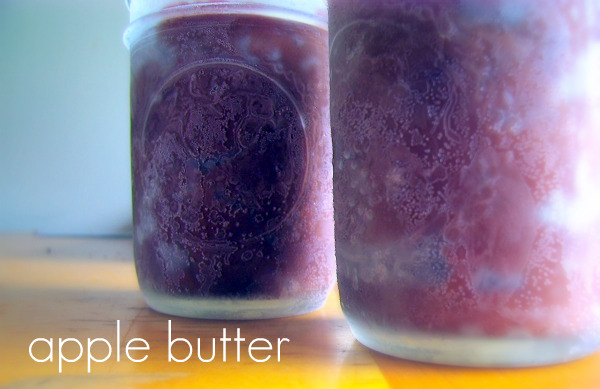Putting Food By Focus: Drying

This article was originally published in September of 2010.
I am pretty much in a food preservation tizzy from now until Thanksgiving. You may start to get bored with my never-ending rambling about fermenting, canning, and drying. Come winter I should have more time on my hands to write some more useful real health articles and even some recipes.
Since I am spending every spare moment squirreling food away for winter I thought I’d do a weekly focus on my efforts, failures, and favorite methods.
This week my efforts included:
- 1 gallon of lacto-fermented salsa into the refrigerator
- 6 half pints of apple butter into the freezer
- parsley and basil frozen whole on sheet pans and placed in gallon bags in the freezer
- 1/2 gallon blueberries into the freezer
- 1.5 quarts mixed dried zucchini, eggplant, and peppers into the pantry
- 3+ quarts dehydrated apples into the pantry

Since my dehydrator has been running for about 70% of the week I thought I’d start there. I try to avoid canning as much as possible and find dehydration to be the most common sense way to do this.
From last year: Five Reasons I Choose To Dry Food
1. Little Energy Required.
Most of us are familiar with electric dehydrators seen on infomercials and in stores. But long before any of us came up with those devices people were drying food for the winter. Native Americans dried strips of meat over campfires to take with on hunting trips. Herbs have been put in bunches and hung upside down to dry for centuries in Europe and all over the world. We have been using an electric dehydrator this year, but my husband hopes to build a solar dehydrator similar to David’s someday.
2. Less Time Consuming.
I find canning to be quite the process with all of the washing, sterilization, boiling water, and preparing of jars, lids and food. It doesn’t help that I’m a novice, but I do find that drying requires less hands-on time and less preparation. Simply chop, blanch if necessary and place on the trays of your dehydrator and let the sun (or electricity) do the work. Cleaning the trays afterward is the only seemingly big job.
3. Makes Winter Meals Easier.
Now that I am seeing bags and jars of dehydrated foods I am imagining all of the soups, stews, chilis and other meals that will come of them. How much simpler can it be to throw together a meal when the vegetables are already chopped for you?
4. Requires Less Storage Space.
I like to store the dried food in either glass jars (my preference) or resealable bags. When you dehydrate you remove the water content, which for a tomato can be upwards of 95%. So you are storing the same amount of food, minus the water content that you will replace later, only using much less space.
5. Child Friendly.
So far I have been unable to come up with a way to incorporate my 3 year old into canning. He usually helps me with all sorts of kitchen and household duties, but with all of the boiling water and hot jars it just doesn’t seem feasible to me at this age. Dehydration, on the other hand, is fun to do with him. Once his hands are washed he is able to place cut up fruits and vegetables on the trays and then remove them and place them in jars or bags when they are done. He loves helping with it and I love that he is working beside me the whole time.
My Favorite Resources
There are a lot of books available on food dehydration. Some of the ones that I like include:
- Preserving Food Without Freezing or Canning. One of my favorite books of all time on food preservation.
- Garden Way’s Guide to Food Drying. My go-to book on food drying. Shows you how to dehydrate, store, and use vegetables, fruits and herbs.
- The Solar Food Dryer. We haven’t built our own yet, but it is definitely on our must-do list.
- Stocking Up: How to Preserve the foods you grow naturally. This book contains a lot of different preservation methods, including drying, canning, and underground storage.
Disclosure: the above are amazon affiliate links.
If you are looking for an electric dehydrator you can find them and various other kitchen equipment on my resources page.
Tell us about your food preservation efforts this week.




Thanks for sharing this, Shannon. You inspired me, a canning newbie, to find a book on other forms of food preservation. What a treat! Working on roasted tomatoes in oil and am toying with the idea of purchasing a dehydrator. However, maybe I’ll go solar instead! Really have gleaned quite a lot of good information from your site–thank you for all your time and effort. 🙂
Thanks for this. I have just started the Nourishing Traditions way of eating. I am going to buy a dehydrator. It seems better to me than freezing, as I live in a very tiny apartment with a very tiny freezer, that can’t fit more than 2 chickens and a small stack of veggies and fruits. Although I have plenty of pantry space. Thanks for your blog I find it very helpful and a joy to read!
I am right there with you. I just did pears and they turned out so good! I would really like to do more vegetables, I have had some bad experiences reconstituting them though. What are some of your favorite vegetables that hold up well to drying? Any you eat dry without reconstituting?
Thank you for opening the door on this subject. I have been thinking about you all week wondering what you were doing. Tues. I picked up my share from my CSA and it included a case of peaches I had ordered. Wed. I called my 97 year old Dad and asked if he would like to come over to help. He was thrilled to be “helpful”. I washed and blanched peaches, he peeled, I cut into bite sized pieces and put on the dryer trays. During all this we worked together to chop onion, tomatoes, peppers and 2 kinds of squash into a 3 gallon pot and got it simmering. Ended up with enough for several meals and five 2-cup containers for the freezer. (It will be appreciated when the snow flys.) Then, while he continued to peel peaches, I also diced onion, garlic and sausage to brown before adding some washed, trimmed and sliced oriental greens that came from the farm. We also de-stemmed, washed and blanched a huge batch of organic grapes I had found at the grocers. They filled a dryer tray. Wonderful raisins for our cereal this winter. We stopped after 6 hours. Dad looked up once and said he just knew Mama was looking down from heaven watching us and smiling. He later said he slept real well that night because he was tired for once instead of bored. The next day I finished the peaches, filling 5 dryer trays and several cookie sheets for the freezer. This morning I transferred those into freezer bags. Today I need to de-stem wash and cut a big batch of green beans. Plan on eating all of those in the next few days. Then I better dice up some carrots and get them dried for this winters rice pilafs and soups. And I wonder why some nights I feel wiped out. I don’t have toddlers running around like some of you, but I have 67 years under my belt. Oh, I will never go back to canning. Too much work, too heavy, too hot, heats up the house, need too much room to store. I love drying, freezing and fermenting. Have 3 gallons going right now, aging in the garage refrigerator, Kim Chi, snowpeas and carrots. My Dad says the Kim Chi, carrots, beets and red cabbage are his favorite flavors. I like to try new and different combinations just to see what he will like. Happy harvesting!!
This week I canned plum-honey-cardamom preserves, pickle relish sweetened with honey, dill pickles and chicken broth. We’ve also canned peaches, green beans and stewed tomatoes, and assorted jams and jellies. I’ve dried mostly fruit and herbs – strawberries, fruit leather, peaches, stevia, tulsi, plantain (the weed, not the banana -like thing), cinnamon basil, opal basil, sage, chocolate mint, lemon balm, chamomile…ugh…would need to check the pantry. We freeze corn and peas, strawberries, cherries, blueberries, broccoli, mixed veggies, shredded zucchini and a few other odds and ends. I’ve got a root cellar for potatoes, carrots, beets, and onions. Pumpkins and squash go into cool storage. Some plants get dug up and brought in from the garden (celery, parsley – planning to try stevia and tulsi this year, too). First they move into the greenhouse, then into a south facing window. It’ll be time to make sauerkraut soon, along with tomato sauce and salsa.
Harvest time is busy time.
I’ll give you another reason to love dehydrating. Even if you store your dehydrated food in glass canning jars (I do, too) you still have less of a problem in an emergency situation. Compare the mess of canned peaches (in sticky sugary syrup) vs. dehydrated peaches if a jar gets broken from earthquake, tornado, flood or error. A broom will clean up the dried pieces of fruit and the glass, but the sticky syrup would take a LOT of rinsing and cleaning up after!
I was wondering if you could give me (us) the recipe for your apple butter – it looks either red or blue in your picture and I’d love to make up a batch for morning toast and oatmeal.
I’m sure its a very simple recipe but yours looks different and more tasty than any other I’ve seen.
PatsyAnne
I have a dehydrator full of zucchini slices thanks to our 4 old. Thanks to another son’s help, there is a large pot of applesauce cooling before we put it through the food mill and then freeze it. There are lots more apples to go and I’m hoping we will turn some of them into apple butter for canning. We’ll refill the dehydrator with peppers when the zucchini is done. I have a big bag of green beans to start lacto-fermenting this afternoon, Lord willing. Some of the stock simmering on the stove will be part of tonight’s soup, and the rest will go in the fridge for using during the week. I canned some tomatoes this year for the first time, with the help of a friend and we’ve dehydrated zucchini several times this season, as well as well as kale. We’ll be enjoying lo-carb Itailian wedding soup this fall and winter. 🙂
I have also been preserving like crazy lately! Canning green beans, crabapple butter, applesauce, and juice. Plus dehydrating basil, kale, apples, and mushrooms. And speaking of saving money dehydrating. I’ve been using my car to dehydrate. Works great as long as it’s a sunny, warm day!
Oh, how much do I wish I had a dehydrator for all the zucchini we’ve got?! And all the apples we’ve scrumped too would be perfect with a dehydrator. Well, at least one day, when I do, I’ll be so thankful for this blog post in helping me with other ideas on preservation. I’m currently freezing blueberries and blackberries in abundance!
Food dehydration is great because it gives us the most benefits in terms of food shelf life (and preserving nutrients) with minimal effort. We achieve more by doing less.
It’s really something all families should consider.